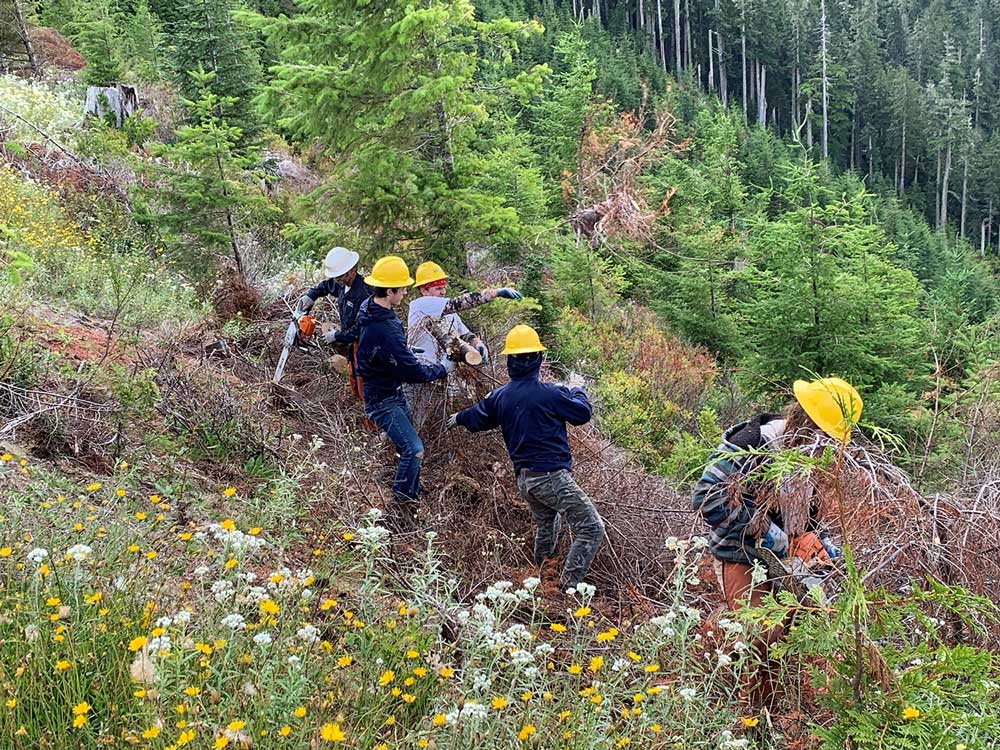MISSOULA, Mont. — In an ongoing effort to support and enhance wildlife habitat, including the restoration of landscapes charred by wildfire, the Rocky Mountain Elk Foundation and its partners allocated $1,064,039 of grant funding across Washington.
“The Lick Creek and Silcott Wildfires burned more than 50,000 acres in Asotin County alone in 2021, detrimentally impacting critical habitat for elk, mule deer, bighorn sheep and other wildlife,” said Blake Henning, RMEF chief conservation officer. “This funding will address invasive weed growth, replant native vegetation and replace fencing and water developments across 2,500 acres in line with our previously announced $1 million wildfire restoration commitment.”
RMEF supplied $315,875 in funding that leveraged $748,164 from its partners.
The grants support a total of 14 habitat enhancement and hunting heritage projects across 13 counties as well as four statewide projects. They include invasive weed treatment in the Blue Mountains, improving elk habitat in the South Fork Skokomish River watershed, replacing dilapidated fencing with wildlife-friendly fencing on the Gifford Pinchot National Forest and several mentored hunting opportunities.
“We thank our members and especially recognize our volunteers who plan and host banquets and other events to raise this crucial funding,” said Kyle Weaver, RMEF president and CEO.
Below is a list of Washington’s 2022 projects, shown by county.
Asotin County
- Implement invasive weed treatment and planting strategies across 2,500 acres of the Umatilla National Forest, state and private lands in response to the 2021 Lick Creek and Silcott Wildfires. A large amount of acreage that burned will recover naturally but other areas in marginal condition prior to the fires are susceptible to noxious weed infestation. The treatments are part of RMEF’s $1 million commitment to wildfire restoration across several states.
- Treat 794 acres of invasive weeds on state and private lands in the Blue Mountains Wildlife Area Complex to protect and enhance elk habitat (also benefits Columbia and Garfield Counties).
Chelan County
- Provide funding to seed 92 acres of disturbed areas within the Colockum Wildlife Area, including skid trails, roads and landings with a mixture of native forage, after crews conduct forest restoration work. They plan to strategically thin patches of small trees while leaving thicker patches of timber for elk security. The work will improve habitat while lowering the risk of wildfire.
Cowlitz County
- Supply volunteer manpower to help cut invasive Scotch broom from 115 acres within the Mount St. Helens Wildlife Area. Volunteers also plant more than 1,000 willow shoots along the Toutle River and install cages to protect regenerating trees and shrubs from being overbrowsed by wildlife.
Mason County
- Create forage openings, treat invasive weeds and plant/seed native vegetation across 250 acres in the Hood Canal Ranger District on the Olympic National Forest to improve Roosevelt elk habitat in the South Fork Skokomish River watershed.
Okanogan County
- Provide funding and volunteer support for the Bonaparte Lake Youth Fishing Derby, an opportunity for boys and girls ages 14 and under to learn about fish, water safety and to go fishing (also benefits Ferry County).
Pend Oreille County
- Thin 325 acres of overstocked mixed conifer stands to improve habitat and promote forest health and fire resilience.
Pierce County
- Burn 18 acres and treat 65 more in the Snoqualmie Ranger District on the Mount Baker-Snoqualmie National Forest to address invasive weeds and other habitat challenges. Signage will also inform the public of the importance of the elk forage area (also benefits King County).
Skamania County
- Provide funding to replace half a mile of old fencing with wildlife-friendly fencing in the Mount Adams Ranger District on the Gifford Pinchot National Forest. The project creates a safer passage for elk and other wildlife while keeping livestock out of meadows.
Yakima County
- Burn 812 acres to aid forest restoration efforts for high-quality wildlife habitat on the Oak Creek Wildlife Area as part of an ongoing effort that began in 2017.
Statewide
- Provide funding for Salmon for Soldiers and its free fishing opportunity for approximately 350 soldiers on boats supplied by volunteers. The outing includes a barbecue, raffles and other activities.
- Supply funding for guided elk hunts hosted by Cross the Divide, a nonprofit that helps Washington veterans and their families navigate life’s challenges.
- Provide funding for the nonprofit organization Outdoors for Our Heroes to take disabled veterans and first responders on big game hunts.
- Supply funding for the Chris Christensen Memorial Youth Deer Camp, which offers 12 first-time youth hunters the opportunity to go on a deer hunt. Participants and their families receive training on a variety of fronts including firearm safety, hunt preparation, field dressing, wilderness survival and more.
Project partners include the Gifford Pinchot, Mount Baker-Snoqualmie and Olympic National Forests, Washington Department of Fish and Wildlife, private landowners and conservation, business, civic and other organizations.
Since 1985, RMEF and its partners completed 755 conservation and hunting heritage outreach projects in Washington with a combined value of more than $ 133 million. These projects conserved and enhanced 506,433 acres of habitat and opened or improved public access to 130,661 acres.
About the Rocky Mountain Elk Foundation:
Founded more than 38 years ago and fueled by hunters, RMEF maintains more than 225,000 members and has conserved nearly 8.4 million acres for elk and other wildlife. RMEF also works to open and improve public access, fund and advocate for science-based resource management, and ensure the future of America’s hunting heritage. Discover why “Hunting Is Conservation™” at rmef.org or 800-CALL ELK.
